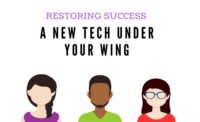Stories rich in history, struggles, perseverance, success and achievement are just some of characteristics of the journeys shared last month at the Violand Management’s Women in Restoration summit led by R&R's very own, Michelle Blevins. This year’s event was based on writing our own story as restoration professionals as it is an important and powerful concept. In addition to a day of fun and comradery, the stories led to ideas and inspiration and also led to connection and positivity. Knowing your story, sharing your story, and hearing the story of others in our industry can be of great value to you, your organization, and your soul.
Story telling has become the new “hot topic” and subject matter in the business world. Initially, my cynical side thought, “a gimmick topic that has limited or no value to an operation…”, then I went to a workshop about story telling and I gained a deeper understanding and respect for the process of defining or exploring an individual’s story. As I pieced together my story, my childhood, influences, my turning points and obstacles, I understood on a deeper level my sense of purpose and how it formed. It also became clear to me that my story has a direct influence on my leadership and values and ultimately the culture, purpose and values of my organization.
As I went back to my company, I talked with many of my coworkers about their stories and personal sense of purpose and it all made sense. Their respective rolls and passions in the organization fit to their story and purpose with their professional endeavors. Each of us has a story that has led us to who we are, what we do, and how we do it. Our stories go beyond story telling and sharing; our stories let us get more in tune with our purpose and drive as individuals. As organizations, the story likely has a direct impact on the values, culture, and even processes of the organization.
My recent experiences with storytelling helped me ponder several notions. First, there is the big story which is the journey that led us to what we are today as individuals and collective organizations. In addition, there are lots of little stories that shaped us and our companies. Story telling and the importance of the journey shaping our values and culture is not new. “Grandma and Grandpa are frugal because they lived through the Great Depression.”
The power of our stories is indisputable. Consider the movies, books, and people’s who stories have inspired and engaged so many of us. As restorers, knowing, sharing, and listening to stories can be of great value personally, professionally and for both individuals and organizations, the stories can:
- Communicate who you are and what you believe in and create a deeper sense of connection with others. Developing relationships and communicating your capabilities through story telling can be very compelling and credible.
- Help communicate and engage the team with the values and purpose of the organization. Consider telling the story from the beginning during the interview process to help start a foundation for engagement and accountability to the new perspective team member.
- The past, your history, the journey can often bring clarity and direction to the future.
- Engage your team members by giving them the insight and understanding to their story, passion, and purpose and to have the opportunity to continue the professional journey in the industry and in your company with alignment and joy. It also helps in connecting and understanding your team mates and contribute to their success.
- Many policies, procedures, and “must dos” probably have a “story” behind them; share the story to allow for understanding and commitment from others.
- Story listening can help you learn from others, find inspiration and energy, and make you smile.
Storytelling, story sharing, and story listening can bring you much restoring success.





Report Abusive Comment